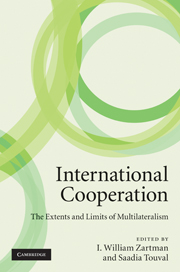Book contents
- Frontmatter
- Contents
- List of figures
- List of tables
- List of contributors
- Acknowledgements
- 1 Introduction: return to the theories of cooperation
- Part 1 Multilateral meanings of cooperation
- Part 2 Multiple strategies of cooperation
- 6 Synthesizing rationalist and constructivist perspectives on negotiated cooperation
- 7 The shadow of the past over conflict and cooperation
- 8 Chicken dilemmas: crossing the road to cooperation
- 9 Conflict management as cooperation
- 10 Status concerns and multilateral cooperation
- 11 Asymmetrical cooperation in economic assistance
- 12 Conclusion: improving knowledge of cooperation
- Bibliography
- Index
6 - Synthesizing rationalist and constructivist perspectives on negotiated cooperation
Published online by Cambridge University Press: 05 June 2012
- Frontmatter
- Contents
- List of figures
- List of tables
- List of contributors
- Acknowledgements
- 1 Introduction: return to the theories of cooperation
- Part 1 Multilateral meanings of cooperation
- Part 2 Multiple strategies of cooperation
- 6 Synthesizing rationalist and constructivist perspectives on negotiated cooperation
- 7 The shadow of the past over conflict and cooperation
- 8 Chicken dilemmas: crossing the road to cooperation
- 9 Conflict management as cooperation
- 10 Status concerns and multilateral cooperation
- 11 Asymmetrical cooperation in economic assistance
- 12 Conclusion: improving knowledge of cooperation
- Bibliography
- Index
Summary
The literature of international politics often focuses either on the structure of the relations between states and other actors within the international system or on the role of agents (or actors) within those systems, usually states, but sometimes substate collective actors or even individuals. A third and important form of analysis evaluates the interactions among actors that are both shaped by and shape the structure of relations between them. These patterns of interaction are generally treated in terms of two primary dimensions: hierarchy (that is, relative power positions among them, whether symmetrical or asymmetrical) and a conflict–cooperation continuum.
The two dimensions are largely independent of each other. For example, power relationships between the United States and Canada as compared with those between the United States and Iran are quite similar – both are highly asymmetrical. But the nature of the interactions is nonetheless quite different, as the former is characterized by a high degree of cooperation whereas the latter exhibits substantial conflict. While the first dimension tends to focus mostly on material relations among the actors, the latter operates much more in the ideational domain, that is, on the extent to which the actors share common interests and identities versus holding divergent interests and values. Thus, to return to the example above, the asymmetrical relationship between the United States and Canada is largely cooperative, due to the presence of common interests and, even more importantly, common identities as Western (and especially North American) democratic nations, whereas the United States and Iran have relatively few common interests and share even less in terms of common values and beliefs about the world; each one views their counterpart as an alien “other” set very far apart from itself on almost any ideational dimension.
- Type
- Chapter
- Information
- International CooperationThe Extents and Limits of Multilateralism, pp. 95 - 110Publisher: Cambridge University PressPrint publication year: 2010
- 1
- Cited by



